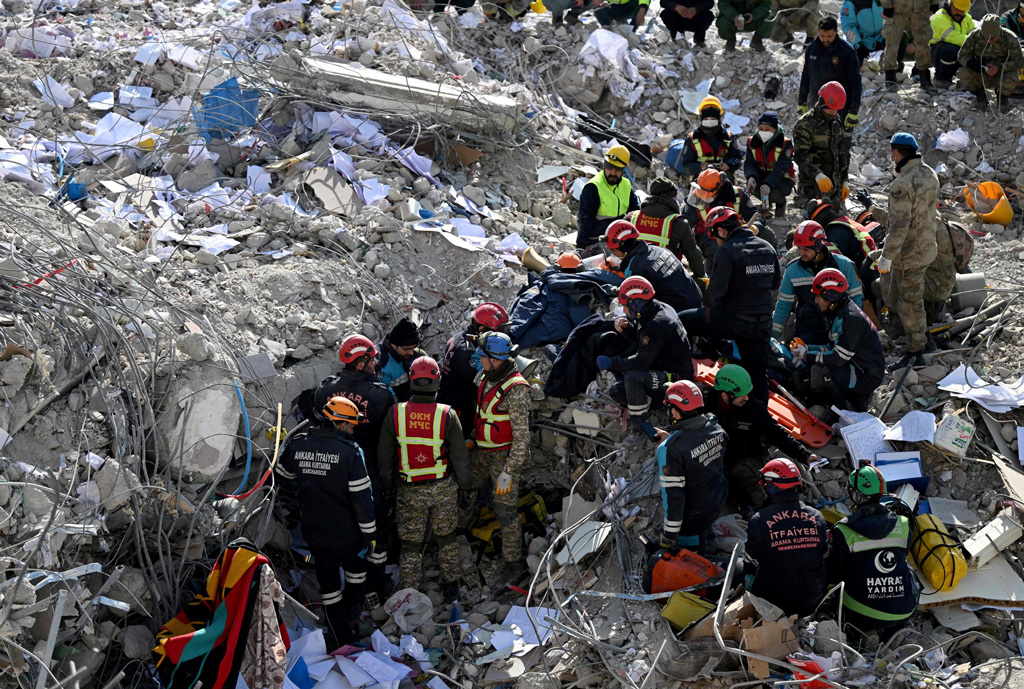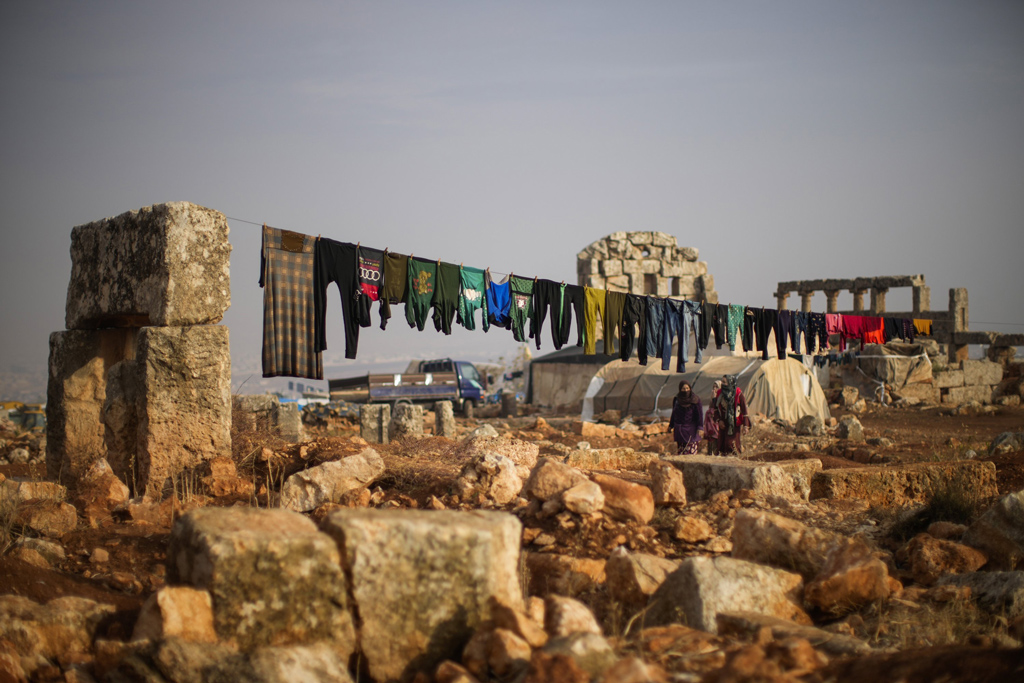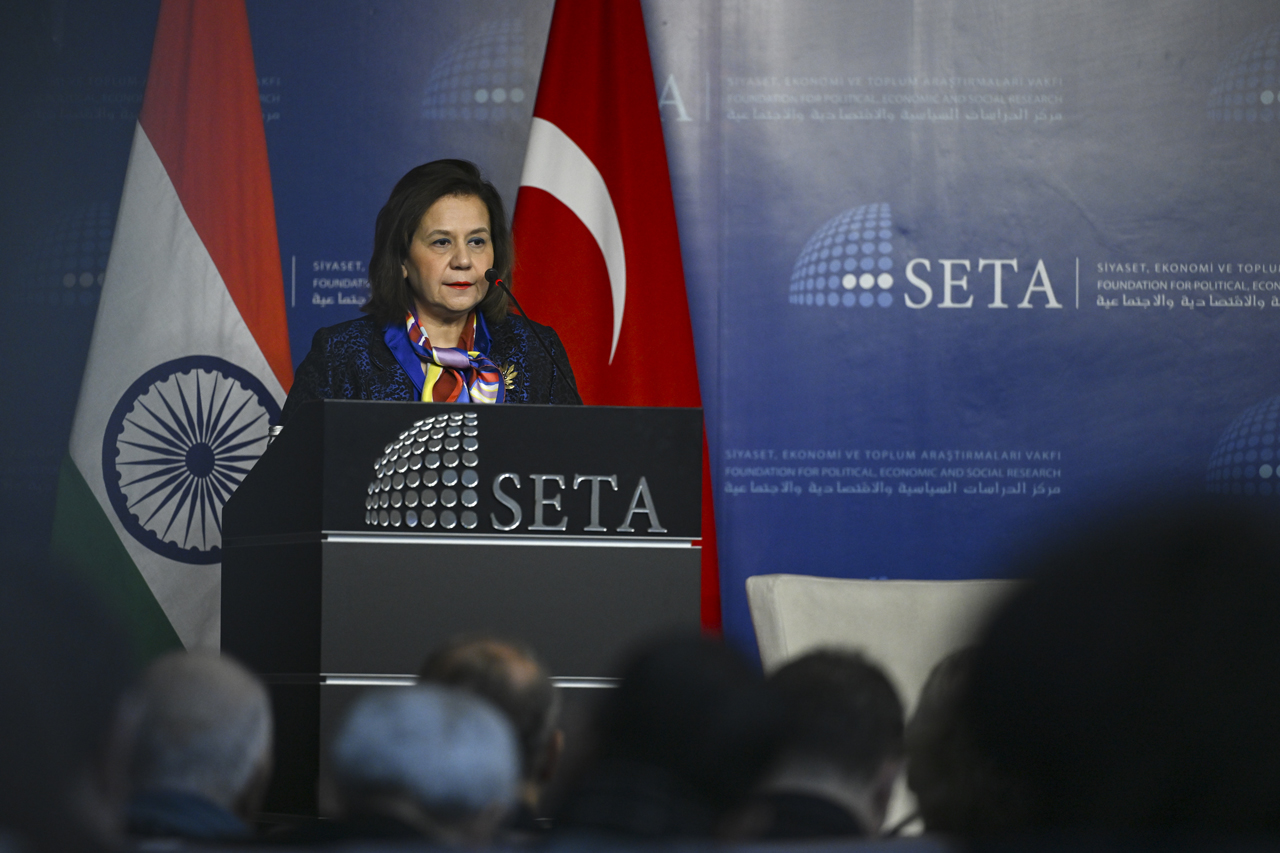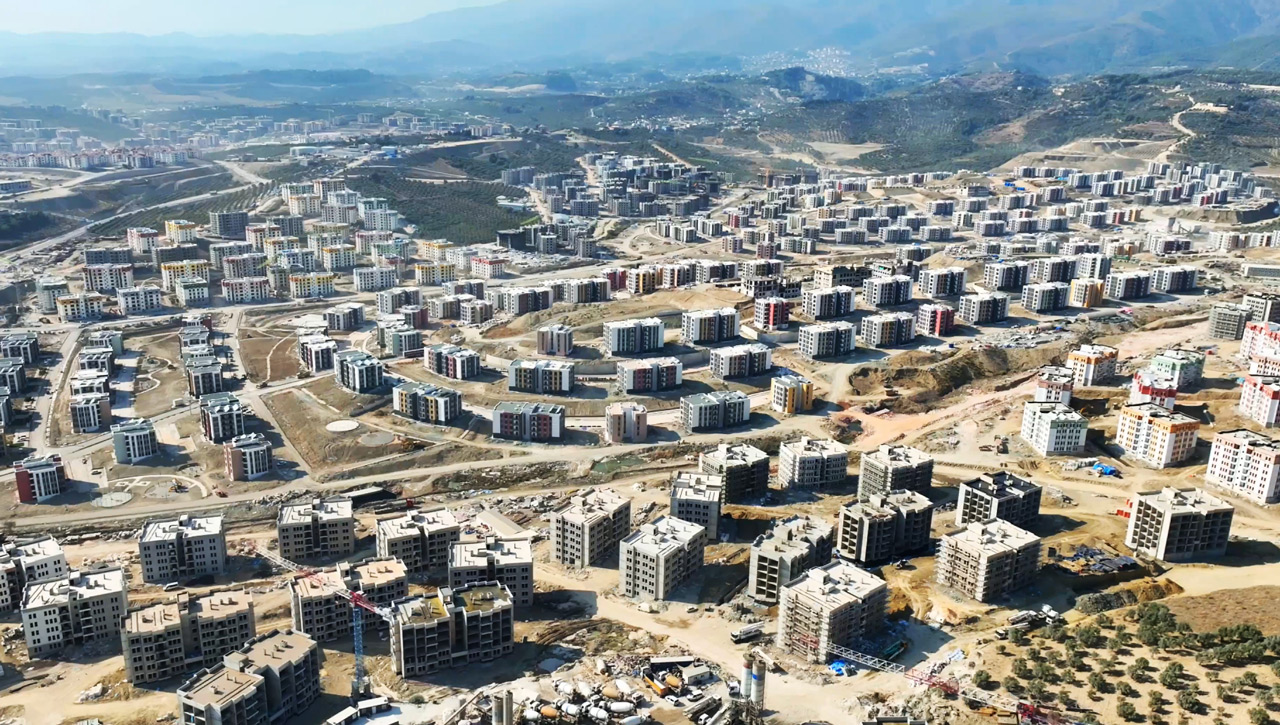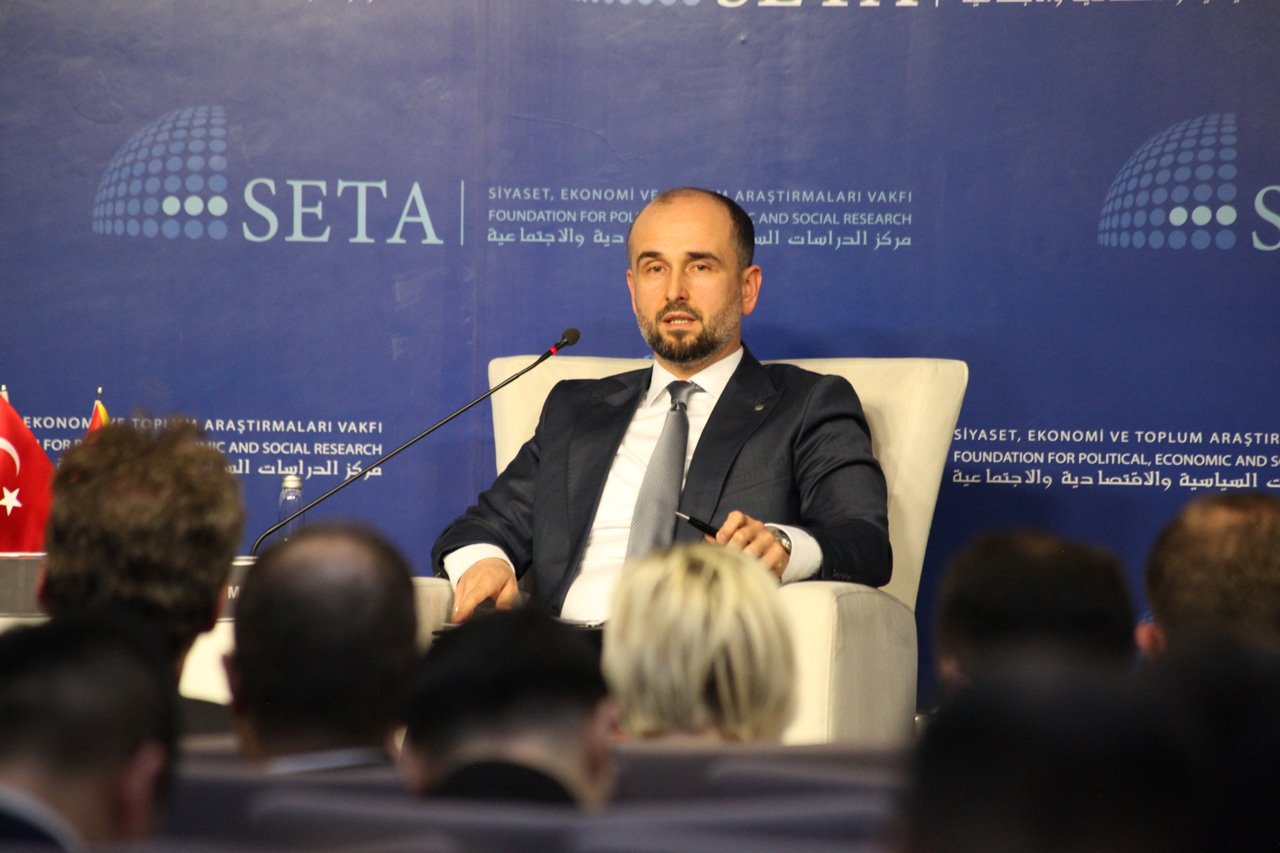Recent report published by the Foundation for Political, Economic and Social Research (SETA) shows surging Islamophobic activities in the political environment, media outlets, on streets and in business life in 25 EU countries as hundreds of Muslim Europeans encounter hate speech and physical attacks in daily life. Compiled by Enes Bayraklı and Farid Hafez, the 582-page report, which can be found in full on SETA's website, includes the European Islamophobia Report's (EIR) nation-based findings on Islamophobic activities. It indicates the Charlie Hebdo and Saint-Denis terrorist attacks in Paris in 2015 and increasing refugee and migrant crisis as turning points in spreading Islamophobia and hate speech in EU countries. Islamophobia is considered one of the strong driving stimuli in the radicalization of young Muslims in Europe.
One of the reasons behind the radicalization of young Muslim Europeans is seen as their failure to be fully accepted into European societies, even those who were born and raised in Europe and have European passports. In the report, including Islamophobic activities in chronological order in 25 EU countries, most hate speech and physical violence directed at Muslims was recorded in Western Europe, where terrorists have also intensified their attacks. Islamophobia in Northern Europe is different than in western EU countries as there have been no significant recording of Islamophobia until recently. Northern European countries can be classified as those that are affected by the ongoing terrorist activities and Islamophobic remarks in Central and Western Europe. In Central and Eastern European countries, Islamophobia increased along with the refugee and migrant crisis in Europe rather than terrorist activities as in western EU countries. . Islamophobia in Southern Europe is based on migrants trying to reach EU countries, with the latest terrorist activities also flaring up Islam and radicalization discussions in countries such as Italy and Greece.
EXPERTS SAY ISLAMOPHOBIA AND TERRORISM TRIGGER EACH OTHER
In comments to Daily Sabah, Bayraklı said that Islamophobia increased 500 percent, especially in France, after the latest terrorist attacks. He said these Islamophobic acts give the message "You are not welcome here" to Muslims in EU countries. Touching on the cycle of Islamophobia and terrorist attacks, Bayraklı said Islamophobic remarks cause Muslims to fail to adapt to EU values and instead turn toward radicalization.
On what should be done to prevent Islamophobia spreading, he said it must be defined as a crime, not just discrimination, and the organizations, including the police and judicial systems, should record Islamophobic incidents in EU countries.
"There is no general recognition of Islamophobia due to the rising of far-right parties in Europe," he added.
Describing terrorist activities as a result of a lost generation of Muslims both in Arab countries and Europe, Bayraklı said othering Muslims in Europe, increasing Islamophobia and problems in ghettos of economically disadvantaged people cause radicalization and pave the way for DAESH and other similar terrorist organizations.
He explained that the EIR was first published this year and is planned to be published every year in March, including all contries in Europe.
ISLAMOPHOBIA IN NORTHERN EUROPE
Finland: In general, Muslim Finns are of Iraqi, Somali, Kurdish, Turkish, Albanian Kosovar, Persian and Bosniak origin, which is why most of the foreign-born Muslims have a refugee background, and reasons such as family reunification, study and work contributed to the immigration of Muslims to Finland, which is different from the reasons in many European countries. A planned mosque construction in Helsinki resulted in protests as some argued that it would only increase the radicalization of Muslims and cause noise, pollution and disorder.
According to the report, one of the civilians who started initiative against the construction argued: "In no religion other than Islam has there been as much violence and hate as well as killing and terrorism." In Finland, significant anti-Muslim activities were not recorded in business or the educational system. Politicians from parties such as the Finns Party and Muutos Party made Islamophobic remarks concerning migration. They spoke out against migration with banners in which a blue-eyed woman wearing a veil was used as a model on posters for the candidate James Hirvisaari with the question: "Tomorrow's Finland?" and "Get immigration under control!" as slogans. Apart from politicians, many blogs and online news endorsed Islamophobia, saying: "Islam is not a religion but a political entity," and linked Islam with pedophilia.
Norway: Norway is one of the northern EU countries where Islamophobic and racist positions hardened after the terrorist attacks in Western Europe. The right-wing Progress Party is believed to mobilize support by creating fear of Islam and Muslims, according to the report. PEGIDA-motivated rallies in Oslo also found a way to develop anti-Muslim sentiments in the country, as dozens of people marched in the snow and carried Norwegian flags. The report quoted a white male in his 30s speaking on private Norwegian broadcaster TV2 to Pakistani-Norwegian reporter Kadafi Zaman about what he was doing in the demonstration: "Here to demonstrate my disgust towards such Muslim bastards as you. Such immigrant shit like you." while harassing Zaman by blowing smoke directly in his face."
ISLAMOPHOBIA IN CENTRAL AND EASTERN EUROPE
Croatia: In Croatia, Islamphobia is on the rise related to incidents such as the murder of a Croatian citizen, Tomislav Salopek, by DAESH in Egypt, the refugee route through Croatia, and the use of Islamophobic discourse for political purposes.
The report said that after the November elections in Croatia, some right-wing parties expressed Islamophobic positions as they suggested that the migrant flow from Syria, Afghanistan and Iraq is a threat to Croatia's local traditions, customs and lifestyle. With concerns of lessening employment opportunities with refugees accepted by Croatia and political discourse directly discriminating against migrants, Islamophobia and anti-Muslim acts in Croatia have risen. The report touched on Islamophobic remarks from a member of the Patriotic Coalition, Ladislav Ilcic, in which he said: "Refugees' children are equal but not the same as children of European descent." Ilcic's remarks provoked several media figures, according to the report, as some claimed that Muslims are "a danger" to old Europe, making the way for the rise of xenophobia and Islamophobia.
Poland: Poland is not immune to Islamophobia despite the significantly lower number of Muslims in the country. The reason behind increasing Islamophobia there is linked to terrorist attacks in western EU countries, DAESH atrocities and the migration crisis, according to the latest survey from the Centre for Research on Prejudice at the University of Warsaw and the Common Space foundation. According to the Common Space foundation, 80 percent of Poles do not know any Muslims and 73 percent hold a negative attitude of them, explaining that the negative attitude is due to the discourse in the media and from politicians.
Hungary: In Hungary, which has a historically positive and attitude on Islam, the report said that there is intolerance and negative attitudes on and fear of Islam in recent years. The highest number of first-time asylum applicants in the third quarter of 2015, who were mostly Syrian, Afghan and Iraqi, was registered in Germany and Hungary. With nearly 100,000 more first-time asylum applicants, Hungary saw its number of asylum seekers rising 13-fold compared to the same quarter of 2014. The unchecked migrant flow is significant in triggering Islamophobia and anti-Muslim sentiments in the country. The report said that some Hungarian politicians have joined in with remarks such as "keep Hungary Hungary" and "avoid becoming the Marseille of East-Central Europe." The most attention-drawing among all anti-Muslim political statements in Hungary was Hungarian Prime Minister Victor Orban's remarks that Hungary lived under Ottoman rule for 150 years as a reason why "Hungarians don't want to live with Muslims again."
ISLAMOPHOBIA IN WESTERN EUROPE
France: In France, the European country with the largest Muslim population, anti-Muslim rhetoric and Islamophobic attacks went up 500 percent, according to new figures. The of Charlie Hebdo and Saint-Denis terrorist attacks fueled already existing Islamophobia in France, as imams are targeted, mosques are raided and the country's definition of secularism is shaping a bulwark against Islam, excluding religion from public space altogether. The report draws a worrying picture in terms of Islamophobic acts in 2015 in France. The report cited a Jan. 23 Le Monde article saying that since the beginning of 2015, anti-Muslim acts within one month had been almost as numerous as over the previous year as a whole. Among incidents that drew more attention between the Charlie Hebdo and the Saint-Denis attacks are discrimination against women in headscarves as they have the lowest chances for employment except for their own community businesses, banning headscarves on campuses and increasing voices to accept Christian refugees instead of Muslim ones.
Ghettoization is another problem connected to Islamphobia in France. The report cited Montpellier where Las Cazes High School has a 95 percent intake of citizens of Moroccan origin. Students' mothers called the government's attitude "social-Apartheid" after the Charlie Hebdo attack. One of the leaders of a local movement, including Muslim women of Moroccan origin, said: "We want our children, who are French citizens, to be regarded and educated like others. How do you expect them to feel French if they grow up exclusively with people from their own group?" The report also mentions the Christian refugee issue concerning certain mayors who were ready to accept and welcome refugees, but prioritized Christian. The report also says that in 2015, at least 63 attacks on mosques have been recorded across the country, including seven arsons, four were totally or partially destroyed and three terrorist attacks against them have been avoided.
Germany: In the economically strongest EU country of Germany, 2015 was the year that the Patriotic Europeans Against the Islamization of the West (PEGIDA) movement's anti-Muslim activities, influx of refugees from the Middle East and Afghanistan and media biases against Muslims had been on the country's agenda. The PEGIDA movement caused an outbreak in some other EU countries, and the report showed that around 25,000 people took part in the group's weekly demonstrations in Dresden in 2014, according to the German Interior Ministry. According to the report, most anti-Muslim violence and hate speech comes from the PEGIDA movement. It has been recorded that during PEGIDA demonstrations in Berlin, attacks on Muslims increased throughout 2015. Apart from PEGIDA, online website Politically Incorrect (PI-News) advocate PEGIDA-like ideology with banners with sexist images of a blond and a brown voluptuous woman saying "Islamophobic but sexy"/"Maria instead of Sharia" and their bikinis stating "Burka Free Zone." The report cites a March 2015 Constitutional Court judgment that says primary power is given to schools to decide whether to accept teachers with headscarves or not, and decide if the person and the headscarf is a "direct threat" or not. There have been around 850 attacks on asylum seeker centers and in the third quarter of the year, 13 people have been injured in those attacks up to October 2015.
United Kingdom: In the U.K., 2015 saw anti-Islam rhetoric escalating with a surprise victory for the Conservatives followed by Jeremy Corbyn, a well-known socialist deputy, elected as the leader of the opposition Labour party. The report said that due to the Charlie Hebdo attack, there was deterioration of the representation of Muslims in the media and of political discourse. According to the report, Islamophobic rhetoric has been used and normalized in the U.K. The Henry Jackson Society (HJS) is among the organizations developing neoconservative positions with a pro-Israel agenda, anti-Muslim activities and advocates for a transatlantic military and security regime. Discrimination in the work environment in the U.K. was also cited in the report as women wearing headscarves are either not employed in many business fields or they face hate speech from their employers. The report said that Muslim men were up to 76 percent less likely to find employment of any kind compared to white, male, British Christians of the same age and with the same qualifications. Muslim women were up to 65 percent less likely to be employed than their white, Christian counterparts. The report described this effect as the "Muslim penalty.
Belgium: In Belgium, which was shaken with simultaneous terrorist attacks in March, Muslims make up nearly 6 percent of the population, mostly of Moroccan and Turkish origin. Islamophobic activities significantly increased after the Charlie Hebdo massacre and the raids in Belgium after with the terrorist attacks in Paris. Justified as a means to remove religious symbols from schools, long skirts were banned at schools in a Catholic school in April 2015. The report also said that Mahinur Özdemir, who is well-known for being the first elected political official in Europe wearing a headscarf, was expelled in May 2015. At the end of 2015, a spike in Islamophobia triggered online anti-Muslim posts such as "Fils de puta*n... j'encu*e le prophete" (son of a b*tch, I f*ck the prophet) with a photo of Adolf Hitler. A few months ago, Belgium parliamentarians such as Özdemir also received threatening letter.
ISLAMOPHOBIA IN SOUTHERN EUROPE
Greece: The most important reason behind increasing Islamophobia in Greece is the waves of incoming refugees and migrants, including a large number of Syrian refugees trying to pass to other EU countries through Greece. While discussing Islamophobia in the country, the report touched on three significant events, including the construction of a mosque in Athens, the refugee influx and Paris attacks. The mosque planned to be built in Athens dates to the 1970s, and in 2015 the government decided to proceed with the construction, which elicited a harsh political reaction from people on the far-right. On the refugee issue, more than 700,000 refugees and migrants came to Greece searching for a path to other European countries in the first eight months of 2015, and in December this number reached 800,000. The far-right once again connected the migrant flow with Islam and spoke out against it, according to the report. The point when Islamophobia found a place in Greek media was when the Saint-Denis terrorist attacks in Paris were directly linked with refugees. Following the Paris attacks, a well-known Greek columnist argued in an article that Islam is not a religion like every other, that its nature is warlike and envious and that it is a political program and ideology of barbarization.
Italy: There are around 1.6 million Muslims in Italy out of 5 million foreign residents and Islamophobia across the country is a phenomenon fed by the current insecure atmosphere across the Europe. The most attention-drawing hate speech against the Muslim community was a headline in the Liberoon newspaper on Nov. 14 that said: "Bastardi Islamici" (Islamic Bastards), which was praised some right-wing politicians. Mosques have also been targeted in Islamophobic attacks in Padova, Rimini and Battipaglia. A pig's head was also found on a gate of mosque in Giugliano. According to a survey on discrimination by Eurobarometer, 39 percent of Italians are uncomfortable working with a Muslim and 41 percent would feel at ease if their child was in a relationship with a Muslim.
[Daily Sabah, April 1, 2016]




